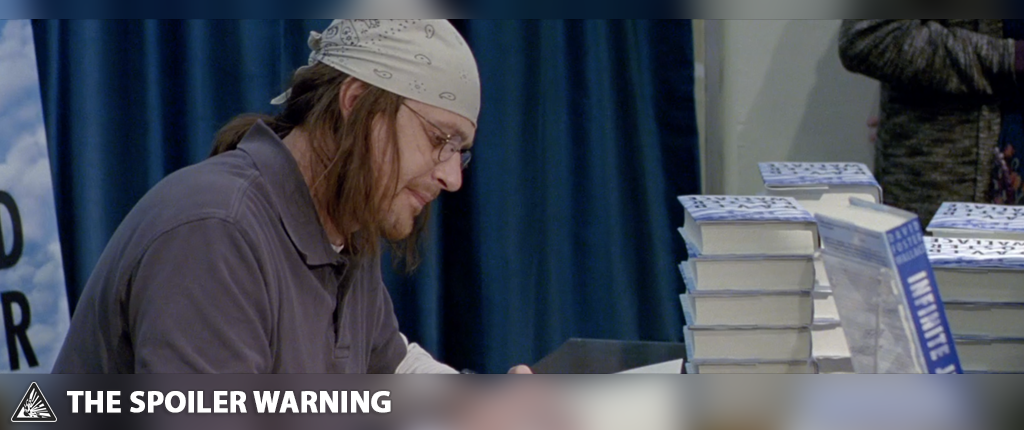“Jason Segel to Play David Foster Wallace in James Ponsoldt’s The End of the Tour.” The headline stuck me as absurd when I read it. James Ponsoldt, chronicler of sweet high school romance and alcoholism. David Foster Wallace, virtuoso author, architect of tangled prose about ununtanglable feelings, patron saint of “Not yet, but it’s next on my reading list.” Jason Segel, perennial schlubby best friend, a sort of stoner Kramer who dances with muppets and showed his penis in that one thing.
Don’t get me wrong. Separately, I have a lot of love for each of these people. That’s actually the problem: I knew them already. From Freaks and Geeks to the last season of HIMYM, I’ve spent years accidentally bumping into Segel. Ponsoldt’s last two films both hold a special place in my heart. And despite an avalanche of pretension headed my way for saying this, Wallace is absolutely my favorite author: not just Infinite Jest, but short fiction anthologies, Harper’s travelogs, a bizarre primer on number theory, and the very interview this film is based on. I wanted it to be good, I did. But mostly I dreaded it with a sort of preemptive, vicarious embarrassment. What if it’s just Marshall Erickson in a doo rag?
In hindsight, I’m not sure why I was so skeptical. Because if there’s one thing all three artists share, it’s a respect for the sincerely-felt mundane. In his now-famous commencement speech, DFW extolled the virtue of the obvious, of the “myriad unsexy” sacrifices that comprise true freedom. His characters struggle with loneliness in privilege, fraudulence in success, addiction, depression, the overwhelming pressure of talent or beauty. Whether found on a luxury cruise or porn convention, “First World Problems” were simply human problems.
James Ponsoldt has plenty of respect for human problems. The best scene from Smashed may as well be narrated by Don Gately: Mary Elizabeth Winstead in her first AA meeting, feeling self-conscious about her lack of a Real Problem, fumbling to explain that Fun just isn’t so fun anymore. The Spectacular Now elevated high school interactions into something powerful, profound — Sutter’s relationship may be a doomed nostalgic blip, but his loneliness strikes us as real and adult. The strength of The End Of The Tour is that it doesn’t try to mold Wallace and Lipsky into tragic figures or cute sentiments; it just asks us to sit and listen. On a groggy freeway at sunrise, cold coffee in tow, talking deeply about life as blinding light hits the windshield. We’ve probably all had a drive like that, where begrudging smalltalk snowballed into something sprawling and personal — the silly philosophical argument that felt so profound in the moment, the moments of silent communion that feel more profound in retrospect. I don’t think it’s a coincidence that this particular brand of intimacy happens side-by-side rather than face-to-face. It’s not about mining for conclusions or peeling back each other’s masks, it’s about living life together, eyes on the road.
Jason Segel’s characters are obsessed with sharing life’s tiny pleasures. This John Bonham solo, that one cheeseburger he swears exists, a puppet rock opera about Dracula — he may be a lawyer or world star chef, but trust him, you have got to get in on this Gouda. As Wallace, he’s a believable contradiction: hyper-verbose artist, lover of Alanis Morissette and Pop Tarts, ex narcotics user whose deepest addiction is television. The everyman persona feels deliberate without ever feeling affected, and that’s a crucial distinction. He knows the Mall of America is gaudy (and Marshall probably doesn’t believe in ghosts), but better to aim at excitement than settle for hip discontent. Relentlessly self-aware, yes, but with a genuine root. Funny enough, the very reason I couldn’t imagine Segel in this role might be what made him so perfect for it. A comedian who traditionally writes his own dialogue, forced to mimic an icon verbatim — isn’t that what fame feels like?
If you can’t tell by now, I’ve been really struggling to make this review cohere. There are too many directions I’d like to take it. I want to tell you about the film’s similarities to the Before series, about how self-aware pretension is so endearing to me. Or about My Dinner With Andre, and that gratifying “Cut the bullshit, you’re a fraud and I’m lonely” moment both films share. Or about the bizarre feeling of watching a movie whose script I’ve essentially already read performed by actors I can’t unrecognize, or the distinct way James Ponsoldt uses light to make it feel like you’ve lived somewhere all your life, or how Good Old Neon would make for a great companion piece if you imagine Lipsky reading a yearbook, or how Jesse Eisenberg is so good at playing an asshole in movies it makes me subconsciously dislike him in real life. And in this sprawling conversation where I’m straining to sound so goddamned insightful, I still haven’t mentioned if I liked the movie.
I really did. I hope you will too. We talk about it more on this week’s podcast.
